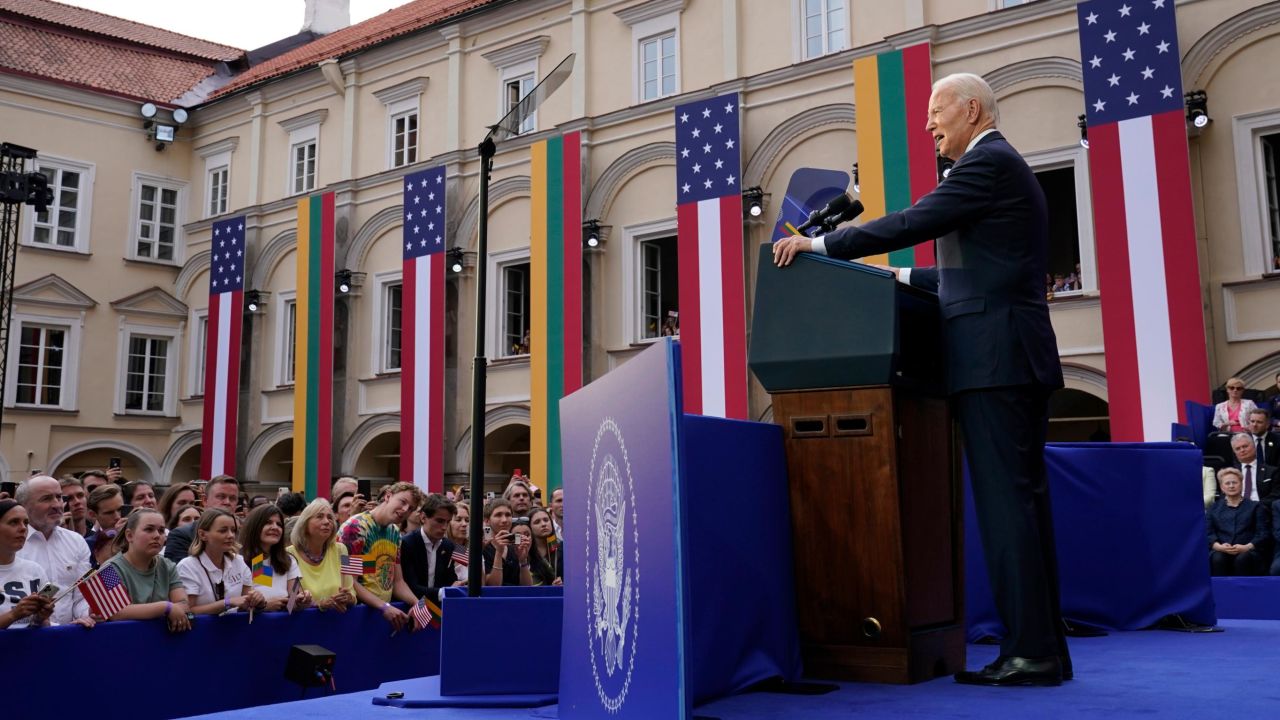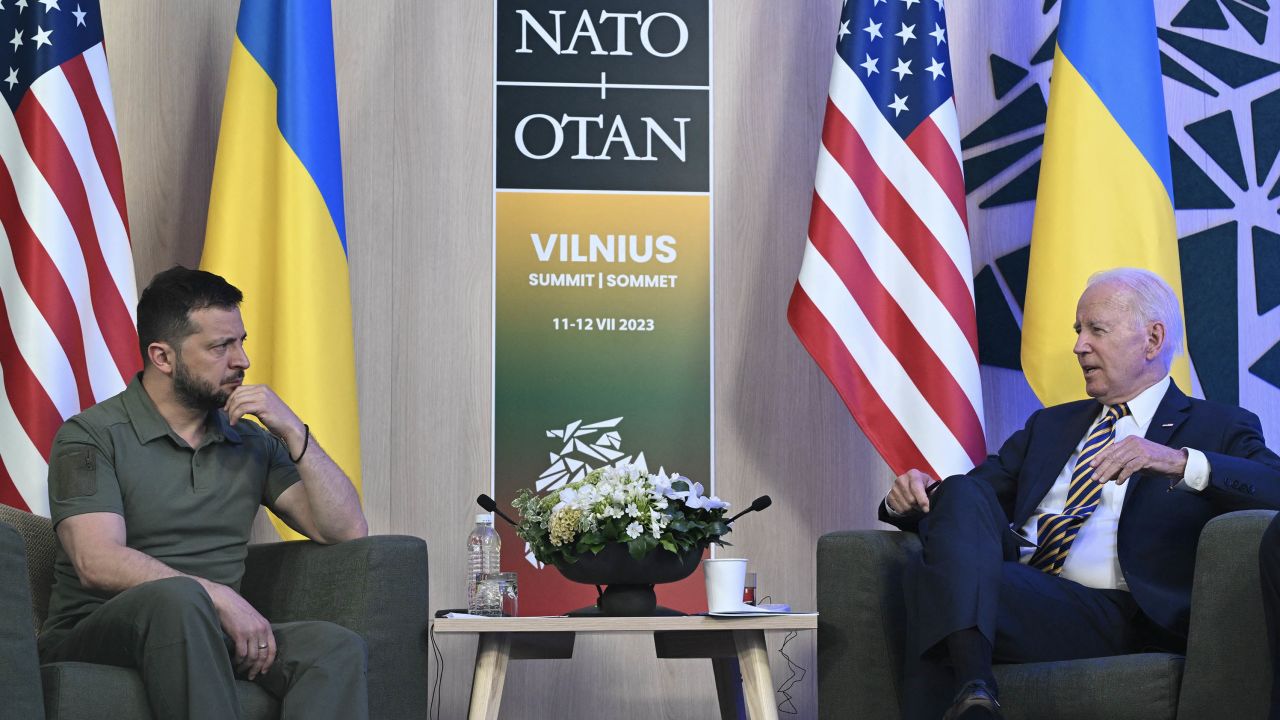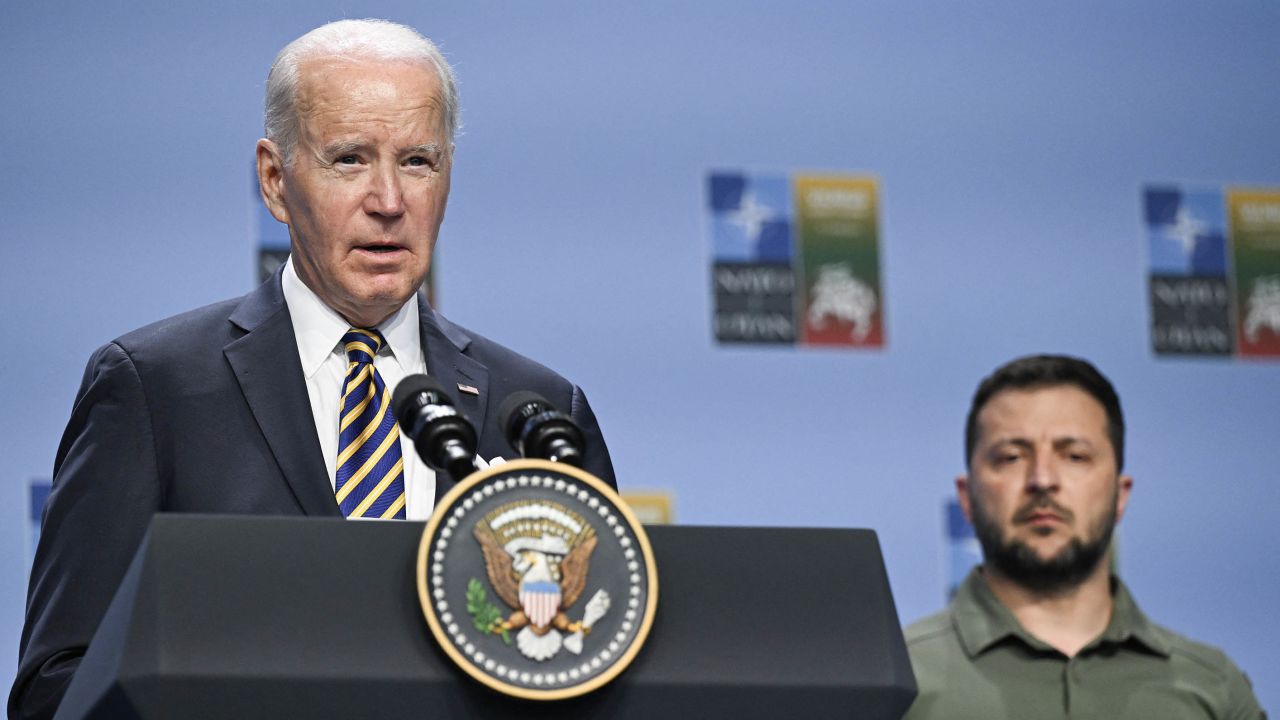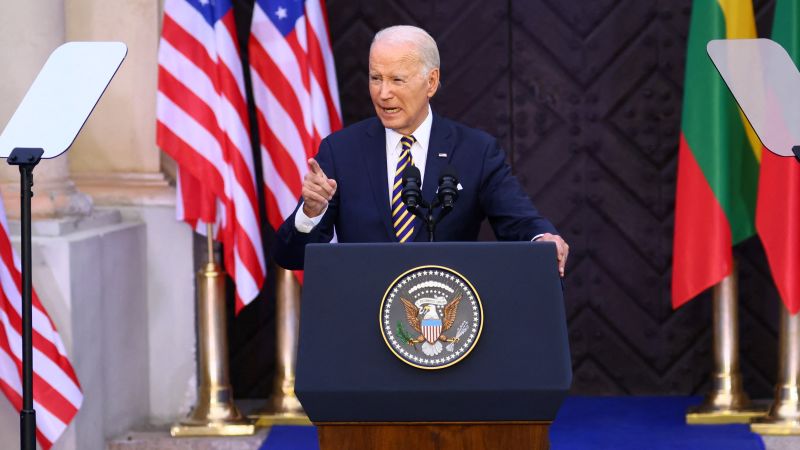CNN
—
President Joe Biden got almost everything he wanted from the NATO summit.
Ukrainian President Volodymyr Zelensky shot for the stars and reached the moon – securing a permanent rearmament pipeline well into the future from G7 nations but failing to win the collective defense guarantee that membership in NATO would bring.
And Russia saw its strategic and military failure entrenched but will surely view the institutionalizing of support for Ukraine as confirming its suspicions of the West.
Poignantly, the meeting hosted by a former Soviet vassal state whose NATO status secured the freedom, independence and prosperity that Zelensky craves for his country, was overshadowed by the torment of the Ukrainian people.
“It’s just like something out of the 14th century the way they are acting,” Biden said, narrowing his eyes in disbelief at the Russian assault on civilians.
Zelensky, who came into the summit as a guest boiling with frustration at the alliance’s unwillingness to give him a timeline for NATO membership, nevertheless contextualized what US and Western help means, in moving remarks to Biden.
“You spend this money for our lives. And I think that we save the lives for Europe and for all the world,” Zelensky told Biden.
The summit ended on Wednesday with a joint declaration from G7 leaders for their nations to negotiate long-term bilateral security commitments for Ukraine to build up its land, sea and air defenses to deter future Russian attacks. The move is a halfway house measure designed to tide Ukraine over until a future moment when it could join NATO and enjoy the “attack on one, is an attack on all” umbrella its members enjoy – a moment that the alliance has yet to determine.
Zelensky arrived at the summit blasting the bloc’s refusal to offer a timeline as “absurd.” But Biden insisted that granting membership now would mean NATO states having to go to war against Russia – a disastrous escalation he has been desperate to avoid.
And while the leaders eased the pathway for Ukraine’s eventual membership, they deferred a fateful geopolitical decision, possibly for their successors, by stating that it had yet to meet economic and political conditions for joining.
The other landmark moment of the summit was Turkey’s sudden dropping of its veto on Sweden becoming the alliance’s 32nd member – which followed months of behind-the-scenes diplomacy by the Biden administration — overseas and in the US Congress.
The president will highlight the post-Ukraine invasion expansion of the alliance, a significant part of his legacy, later on Wednesday by traveling to another new member, Finland. The two Nordic neighbors left behind decades in Moscow’s shadow to apply for NATO membership, after feeling threatened by Putin’s effort to rewrite the map of post-Cold War Europe. Finland’s entry illustrates how the invasion backfired for Putin on a broader continental stage by delivering NATO a frontier hundreds of miles long with Russia itself.
Biden, NATO’s most important leader, went into the summit determined to maintain his balancing act of bolstering Western support for Ukraine’s existential struggle while avoiding the outbreak of a war with Russia, a nuclear superpower. He also needed to remind Americans why billions of dollars of taxpayer cash must continue to be sent to Kyiv, which is becoming a 2024 campaign issue. And before he left Lithuania, he warned Putin that the summit was evidence the Western alliance would not waver.
“When Putin and his craven lust for land and power unleashed his brutal war on Ukraine, he was betting NATO would break apart … he thought our unity would shatter at the first testing. He thought democratic leaders would be weak. But he thought wrong,” Biden said in a speech at in speech at Vilnius University.
The President told CNN before leaving that membership for Ukraine at this time was impossible, given the raging war with Russia. But he also told Zelensky on Wednesday that he understood how irksome the West’s conditions may seem given the horror unfolding in Ukraine.
“The frustration, I can only imagine,” Biden said.

Involving the G7 nations in a permanent flow of arms to Ukraine was a creative solution to fulfilling its future needs while navigating constraints on a tighter relationship between Kyiv and NATO. If carried out, the scheme could effectively make Ukraine a Western-armed vanguard that may not formally be ‘in’ NATO but will still be a linchpin of its forward posture in Europe. The certainty offered by the prospect of long-term defense purchases may also trigger expansions in defense industries in Europe and the US and ease a crisis in getting sufficient ammunition to Ukraine.
It’s ironic that the G7 was the G8 until Russia was kicked out over its invasion of Crimea in 2014 and will now be the entity that could turn Ukraine into a modern defense state in the future.
The G7 agreement also goes some way to cementing the commitment to Ukraine of US and allied leaders in years to come and making Biden’s policies harder to reverse. Ukraine must worry that a future US president – perhaps the former commander-in-chief, Donald Trump – may downgrade American support. Trump’s former Vice President Mike Pence for instance warned on CNN Tuesday for instance that his ex-boss’s vow to end the war in 24 hours could only be honored by “giving Vladimir Putin what he wants.”
While critics may complain the administration is doing too little to help Ukraine – or in the eyes of some conservatives, too much – the summit highlighted Biden’s comfort on the world stage even if it is not recognized in his rough approval ratings.
The president’s decision to skip a leaders’ dinner on Tuesday refocused attention on his advanced age, 80, which is a legitimate issue in the 2024 presidential race. Yet the president’s choreographing of the summit to meet US goals demonstrated considerable diplomatic skill and papered over splits – notably over Sweden and the desire of some Eastern European members to offer Ukraine a faster track to membership.
His experience on Capitol Hill – and choice of a former Republican senator, Jeff Flake, as US ambassador to Ankara who worked to overcome congressional worries about the sale of F-16 fighters to Turkey – could be the key to greasing Sweden’s entry into NATO. The president’s understanding of political forces weighing on fellow leaders was also noticeable when he twice publicly praised Japanese Prime Minister Fumio Kishida for signing up to the G7 aid program for Ukraine.
He also got some good news to return home to Wednesday with new data showing that the rise in the annualized cost of living cooled to 3% in June, raising his hopes of neutering GOP attacks over “Bidenflation.”
Zelensky barnstormed into Vilnius in typical style, using moral and media pressure to pressure NATO leaders to go further on their guarantees. His tone risked offending foreign leaders who have faced questions at home over bankrolling Ukrainian resistance.
Still, Zelensky’s vehemence is understandable since he doesn’t just have a restless electorate to placate. His troops are fighting bloody battles in which morale is vital and a long-planned offensive moves more slowly than hoped.
Civilians are also under assault. On Wednesday for instance, Russia marked the NATO summit by launching airstrikes against Kyiv region.

Still, Zelensky’s tactics of aiming high and squeezing everything he possibly can out of the West may have worked again in the shape of the G7 program.
The potential for tensions to erupt over what NATO was prepared to offer animated a tense exchange earlier on Wednesday between Biden’s national security adviser Jake Sullivan and Ukrainian activist Daria Kaleniuk in Vilnius.
“Please advise me: what should I tell my son? That President Biden and NATO didn’t invite Ukraine to NATO because he’s afraid of Russia?” Kaleniuk asked. Sullivan replied that Americans deserve “gratitude” for supporting Ukraine and dismissed questions about Biden’s motives.
By the end of the day, however, Zelensky was declaring “a significant security victory.” He spun G7 aid as “security guarantees” even though it might be more accurately described as security commitments since it lacks the certainty of NATO treaty requirements.

Western leaders, however, know it won’t be long before their indefatigable Ukrainian colleague asks for more. Constant pressure has frequently dismantled their red lines, and secured high-tech weapons systems, tanks and even the promise of F-16 fighter jets for the war effort.
The entry of Sweden in NATO and solidified long-term G7 support for Ukraine weakened Russia’s strategic position. Even so, the risk of war against Moscow, including an implicit recognition of its nuclear arsenal, still tempers how far and quickly Biden is ready to go in bringing Ukraine into the Western club.
Russia played into this reality when Kremlin spokesman Dmitry Peskov condemned the summit for its “pronounced, concentrated anti-Russian nature” and complained that Moscow was treated as an enemy not an adversary.
NATO leaders must also worry whether the renewed prospect of alliance membership for Ukraine – even without a date certain – will give Russia a fresh incentive for ensuring the war never ends with a formal peace agreement.
And no one in the US government has illusions about the likelihood of Putin relinquishing his illegal claims on Ukraine while he is still in power.
CIA Director William Burns said at the Ditchley Park forum in the UK earlier this month that he’d spent most of the last two decades trying to understand and counter the “combustible combination of grievance, ambition and insecurity that Putin embodies.” He added: “One thing I have learned is that it is always a mistake to underestimate Putin’s fixation on controlling Ukraine and its choices, without which he believes it is impossible for Russia to be a major power or him to be a great Russian leader.”

